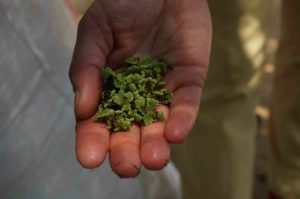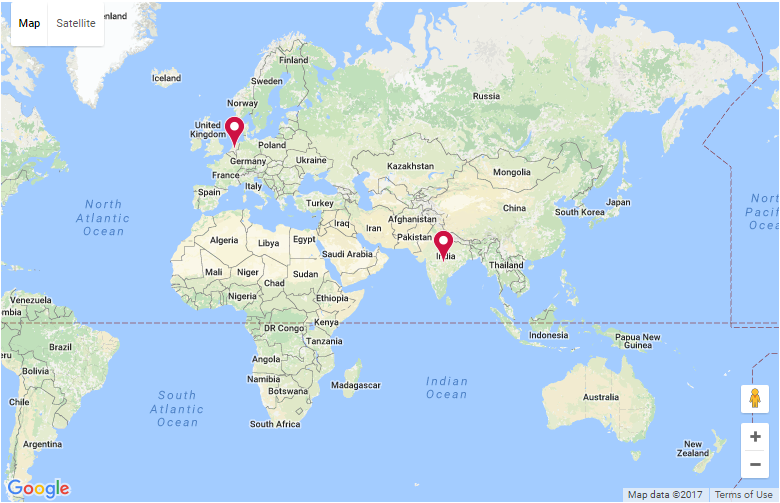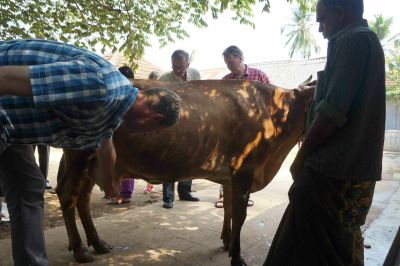Less antibiotics, more balance
Less antibiotics, more balance
The increased resistance of microbes against antibiotics threatens human beings and animals across the globe. Large amounts of antibiotics are used in dairy farming. An increase in the global use of livestock antibiotics of 67% is expected by 2030 (cddep.org/blog/posts). Alternatives are available, such as medicinal plants, but the knowledge has eroded in in the Netherlands and is disappearing fast in countries like India. An E-Motive exchange has contributed to the revitalizations of this knowledge and raised the inspiration to use it in both countries. In 2015 the exchange was expanded to Ethiopia and Uganda.
Description
Less antibiotics, more balance
The increased resistance of microbes against antibiotics threatens human beings and animals across the globe. Large amounts of antibiotics are used in dairy farming. An increase in the global use of livestock antibiotics of 67% is expected by 2030 (cddep.org/blog/posts). Alternatives are available, such as medicinal plants, but the knowledge has eroded in in the Netherlands and is disappearing fast in countries like India. An E-Motive exchange has contributed to the revitalizations of this knowledge and raised the inspiration to use it in both countries. In 2015 the exchange was expanded to Ethiopia and Uganda.
"What I took home is respect for ancient knowledge and culture. Herbs can be effective.”
Dutch farmer Janna
Specialized cows but more frequent disease
In many countries dairy farming has changed from the integrated production of milk, meat and manure for crops to a more specialized system only for milk. To this end the popular Holstein Friesian cow with high milk yields has spread across the globe. The related animal management system and feeding regimes have resulted in cows with frequent disease and shortened life span, especially due to udder infection, infertility and hoof problems.
Indian method for promoting herbal medicine
The Indian method for reducing the use of antibiotics in dairy farming is based on the Documentation and Assessment of Local Health Traditions (DALTH) method developed by the Institute of Ayurveda and Integrated Medicine (I-AIM) – currently a university. DALHT is a participatory, community-based, multidisciplinary, multistakeholder approach involving community experience, historical data on usage through documented textual knowledge as well as globally accessible scientific data. DALHT is combined with ‘Reverse Pharmacognosy’, which is a method of integrating documented clinical experiences and
experiential observations into leads for herbal products by exploratory studies and further developing these into drug candidates or formulations through robust preclinical and clinical research.
Complementary solutions for excessive use of antibiotics
In the Netherlands, due to government policy the agricultural sector (farmers and veterinarians) has reduced the use of AB. Farmers are reducing the use of antibiotics with management practices, including the use of medicinal plants and cross-breeding towards a more resilient cow. In India age-old knowledge and practices using medicinal plants have been revitalized since the 1990s. Indian researchers are bridging the knowledge and practice gap between farmers, veterinarians and other scientists. This knowledge and experience is helpful in a country like the Netherlands, where many professionals are critical about the safety and efficacy of herbal remedies. During the E-motive exchange mutual openness and respect enabled the participants to jointly develop herbal product innovations . They started training sessions and policy dialogues to spread this knowledge.
The E-Motive Exchange between India and the Netherlands started in 2014. In April three Dutch veterinarians and four farmers visited dairy professionals at the I-AIM Institute in Bangalore, South India. A return visit of their Indian colleagues to the Netherlands took place in November 2014.
- Indian farmers and veterinarians told their Dutch colleagues that the use of medicinal plants implies a 90% reduction in their animal health costs. Using Holstein Friesians (HF) breeds in India has largely contributed to the high use of antibiotics, as they often suffer from heat stress, udder infection, infertility and hoof problems. Meanwhile, many local cattle breeds were lost due to systematic castration.
- The Dutch and Indian delegates exchanged their insights on how to improve cow management for better milk production, for example by constant provision of fresh water water and feed.
Farmers and veterinarians from both countries concluded that quality control of milk adapted to smallholder milk collection systems, and a related payment system, are needed to encourage the reduction of antibiotics use in Indian dairy farming.
This project was financially supported by the E-Motive program of Oxfam Novib, with co-funding of the Province of Overijssel, the national Secretary of Economic Affairs, and several participating farmer, dairy and veterinary organizations.
Ton: "What I took home is a lot of knowledge about medicinal plants."
Exchange organizing veterinarian Katrien van ’t Hooft (of Dutch Farm Experience): “Our knowledge turned out to be complementary. One and one is three in this case!”
Ongoing exchange in 2015
In 2015 the exchange was expanded in several different ways:
- Include exchange with two African countries (Ethiopia and Uganda) on the topic of antibiotic reduction in dairy farming, with special emphasis on cattle breeding
- Include several institutes into the visit to India, including veterinary faculty, Animal health institute, and agricultural school VHL. This visit included a national symposium on the topic of medicinal plants in dairy farming for the reduction of antibiotic use, Bangalore May 2015.
The return-visit to the Netherlands is now planned in September 2015. Meanwhile, the exchange has drawn much press interest in both India and the Netherlands, including national Radio, TV and newspapers.
Method
 Method for using less antibiotics
Method for using less antibiotics
This method for reducing antibiotics use is based on the concept of agro-ecology, which strives for a balance in the agricultural system. It also promotes the intensification of ecological farming by smallholders. This view is about improving natural soil fertility, closing mineral cycles, and reducing the use of fossil fuels and chemicals. Such a system is also best in combining the ecological vision of farmers and their economic needs.
A cow out of balance
The high use of antibiotics in dairy farming is largely due to a change from the integrated production for milk, meat and manure for crops, to a more specialized system only for milk. The Holstein Friesian cow with high milk yields has spread across the globe. The related animal management system and feeding regime - based on lots of corn and protein concentrates, and on the use of artificial fertilizer - have resulted in a cow that is out of balance. Holstein Friesians frequently suffer from diseases such as heat stress, udder infections, hoof problems and low fertility. Meanwhile, many traditional cattle breeds have been lost to systematic castrations.
As the cause of the problem is multi-faceted, the way out requires a system change. The approaches in the Netherlands and India are different, though complementary:
Quality control needed
The lessons Dutch and Indian professionals have learned:
- that changes in animal management are needed: different breeding and feeding practices, closing nutrient cycles and improving soil fertility, as well as constant water and feed availability;
- that the use of medicinal plants and herbal grasslands helps to prevent and cure diseases;
- that the quality control of milk and a related payment system are needed to encourage the reduction of antibiotics use in dairy farming.
Partners
NVF Bureau– Netherlands Association for Phytotherapy
The Netherlands Association for Phytotherapy (NVF-Bureau) was founded in 1988, with the objective to improve the quality and scientific foundations of the use of medicinal plants and other natural products: phytotherapy and phytotherapeutic medicine. In 2003 NVF founded and coordinated the Studiegroep Dier en Kruid (animal-herb studygroup) – a networking group of around 100 individuals, companies and organisations. Other activities include project management, conference organisation and publishing a scientific journal on medicinal plant and natural product uses.
Dutch Farm Experience
Dutch Farm Experience is an independent initiative specialized in inspiring individuals and organizations worldwide about Sustainable Dutch Livestock initiatives, with an emphasis on dairy farming The final goal of Dutch Farm Experience is a better world in which milk and other livestock products are produced in a sustainable way: a way in which soil is enriched, animals live well, farmers get a decent income and milk is healthy and without chemicals. Dutch Farm Experience has initiated and is responsible for organizing the E-Motive exchange program.
RIKILT of Wageningen University
RIKILT is an innovative partner for safe and authentic food, specialized in (forensic) measurements, perform top level research and by arrangement 24/7 available in case of emergencies. RIKILT’s international reputation in the scientific world is excellent. A large percentage of the RIKILT peer reviewed papers belongs to the world top 1% and top 10% over the years. This is also reflected by a more than double above world average impact. RIKILT is a partner in many (inter)national public-private partnerships related to research projects in the Dutch ‘Topsectoren ’ and the European FP7 programmes for research collaboration and mobility.
The Dutch Province of Overijssel) (co-financing)
The province acts as the layer of administration between the municipalities and the national government. The province deals with spatial planning, including water management, in addition to public transport and roads, regional economy, nature, culture and heritage. It focuses on a number of core tasks, including rural development and regional economy. The province has co-financed the exchange, and hosted an international symposium on the use of herbal remedies to reduce antibiotic use in dairy farming. A second symposium will be held in October 2015.
I-AIM – Institute of Ayurvedic and Integrated Medicine
In 2013 this institute has transformed into the Trans-Disciplinary University (TDU). This innovative University is focused on the modernization of India's healthcare in the 21st century by bridging, in an epistemologically informed way, the traditional health science and practices of India, with western sciences and technology.
The University has two central purposes: Firstly, lowering costs and enhancing access, quality and reach of healthcare to millions. Secondly, creation of transformative knowledge and making original Indian contributions, to the world of medicine and life sciences. The term Trans-Disciplinary is defined as "the interface of any of the Indian traditional health sciences with other systems of knowledge including; biomedicine, life sciences, social sciences, engineering and management studies".
TANUVAS – Tamil Nadu Veterinary and Animal Sciences University
Realizing the importance of education research in animal and fisheries sciences, so as to increase productivity for better income generation for resource-poor farmers, the government of Tamil Nadu established the first Veterinary and Animal Sciences University in Asia in 1989. The University’s mandate is to impart knowledge, to ensure advancement of learning and pursuit of research, and to undertake extension work for rural people in co-operation with the government departments in different branches of veterinary and animal sciences.
ANTHRA – Livestock Development and Ethno-veterinary group
ANTHRA is a non-profit organization of women veterinary scientists working primarily on issues of livestock development in the wider context of the sustainable use of natural resources. Working mainly, with small and marginal farmers (dalits and adivasis), pastoralists, landless groups and especially with women from these marginalized communities, ANTHRA has a team comprised of experts from the field of veterinary sciences, sociology, medicine, environmental sciences and communication. ANTHRA’s focus areas are: livestock production and farming systems, crops and fodder varieties, livestock and plant genetic resources, medicinal plants and health care traditions, land and water use and the protection of indigenous knowledge related to these.

More info:
http://www.dutchfarmexperience.com/e-motive-project-india-nl-exchange-dairy-farming/
http://www.lc.nl/friesland/ecoregio/article17052563.ece/Kruiden-voor-gezonde-koeien-en-melk-
http://www.omropfryslan.nl/nijs/geen-antibiotica-maar-kruiden
http://www.nom.nl/nieuws/kruidenmengsels-als-vervanging-voor-antibiotica-melkveehouderij/
http://www.keningfanegreide.nl/sticky/nederlandse-boeren-en-dierenartsen-onder-de-indruk-van-indiase-kruidenkennis
https://www.facebook.com/IAIM.healthcare?fref=ts
Contact Details
NVF BureauT. van Asseldonk |
Institute of Ayerveda and Integrated Medicine (I-AIM)M.N. Balakrishnan |

